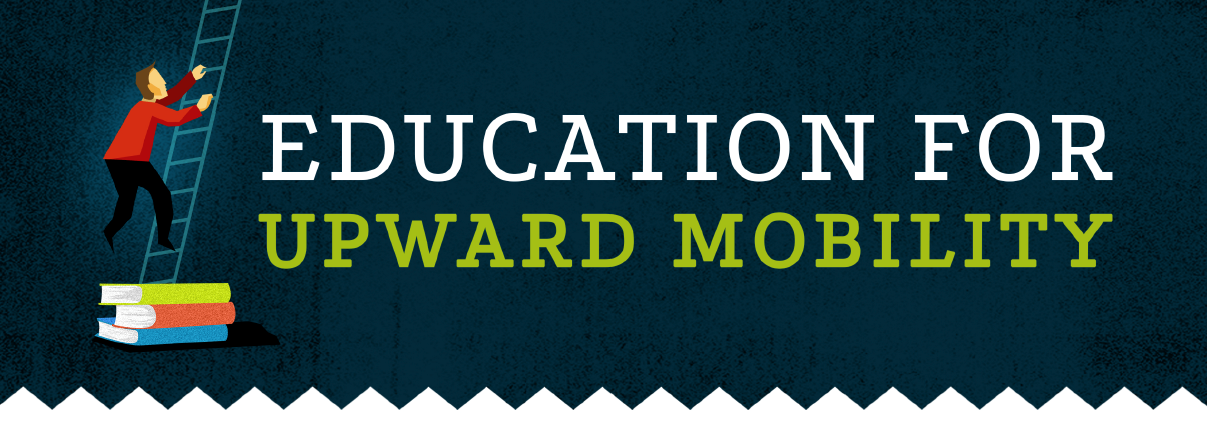
Draft Conference Agenda
Thomas B. Fordham Institute's Education for Upward Mobility
December 2, 2014
The Renaissance Hotel
999 9th Street NW
Washington, D.C. 20001
8:00 – 8:45 Registration, breakfast and coffee available
8:45 – 9:00 Welcome and introductions, Michael J. Petrilli
9:00 – 10:15 Panel I: Escaping Poverty through Education, Work, and Personal Responsibility
About a third of the individuals who grow up in poverty in America climb the ladder to the middle class as adults. What do we know about their trajectory? How can we increase these numbers? What role does education play? Higher education? Industry certifications and other non-degree credentials? Military service? Apprenticeships? Following the “success sequence” (get a high school diploma, work full time, and wait until age 21 to marry and start a family)?
Presenters
Ron Haskins, Brookings Institution: “Education and the Success Sequence”
Andrew Kelly, American Enterprise Institute: “Big Payoff, Low Probability: Postsecondary Education and Economic Mobility in America”
Tamar Jacoby, Opportunity America: “The Certification Revolution”
Robert Lerman, Urban Institute: “How Apprenticeship Can Spur Upward Mobility”
Respondent
Reihan Salam, National Review Institute
10:30 – 12:00 Panel II: Multiple Pathways in High School
Next, we’ll dive deep into the “make-or-break” time for social mobility—the adolescent years, when many students are making critical choices that impact the rest of their lives. A key question is whether we should move away from “comprehensive” high schools and today’s widespread focus on “college prep for all” and towards a “multiple pathways” approach, including high-quality career and technical education and youth apprenticeships. If yes, how might we do so without the downsides of old-fashioned tracking? And what can we do for the students who arrive in high school vastly unprepared?
Presenters
Peter Meyer, Independent Writer: “Small Schools of Choice”
Joanne Jacobs, Independent Writer: “College Prep High Schools for the Poor”
Bob Schwartz, Harvard University: “High-Quality Career and Technical Education”
Respondent
Marc Sternberg, Walton Family Foundation
12:00 – 1:30 Lunch and keynote address: Hugh Price, Senior Fellow, Brookings Institution
"What the Military Can Teach Us About How Young People Learn and Grow”
1:30 – 2:45 Panel III: Zero to Thirteen
Next, we’ll examine the foundational years. What are the best practices of poverty fighting in pre-schools, elementary schools, and middle schools? How can the pre-K–8 years get as many low-income children as possible ready for success across multiple pathways? Should we embrace ability grouping and tracking? Maintain a heavy focus on “non-cognitive skills” like drive and prudence?
Presenters
Elliot Regenstein, Ounce of Prevention Fund: “Starting at Five Is Too Late: Early Childhood Education and Upward Mobility”
Robert Pondiscio, Fordham Institute: “Poverty-Fighting Elementary Schools: Knowledge Acquisition is Job One”
Tom Loveless, Brookings Institution: “Tracking in Middle School”
Respondent
Dacia Toll, Achievement First
3:00 – 4:30 Panel IV: Implications for the Education-Reform and Anti-Poverty Agendas
This final panel will consider the implications of the day’s proceedings for policy and practice, in both the worlds of education reform and broader efforts to alleviate poverty. What mid-course corrections must we make if we want to maximize poor kids’ chances for self-sufficiency and climbing the ladder to the middle class? What would switching from a “college-for-all” mentality to a “multiple-pathways” approach mean for the standards-and-accountability movement (and Common Core in particular), the school-choice movement, and efforts to boost teacher effectiveness? And who needs to do what at the federal, state, and local levels?
Panelists
Sheldon Danziger, Russell Sage Foundation
Howard Fuller, Black Alliance for Educational Options
Rick Hess, American Enterprise Institute
Andy Rotherham, Bellwether Education Partners
4:30 – 5:30 Cocktail reception

